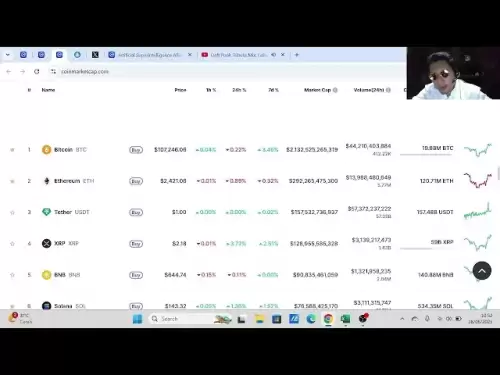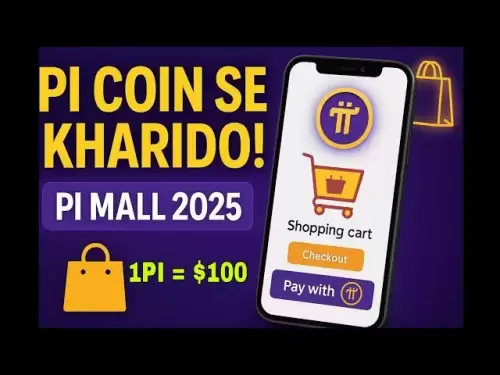-
 Bitcoin
Bitcoin $107,352.1067
0.28% -
 Ethereum
Ethereum $2,429.3531
-0.90% -
 Tether USDt
Tether USDt $1.0001
-0.02% -
 XRP
XRP $2.1894
4.62% -
 BNB
BNB $646.7968
0.36% -
 Solana
Solana $147.4290
4.03% -
 USDC
USDC $0.9998
-0.02% -
 TRON
TRON $0.2756
1.52% -
 Dogecoin
Dogecoin $0.1630
1.14% -
 Cardano
Cardano $0.5612
1.18% -
 Hyperliquid
Hyperliquid $37.0580
-0.05% -
 Bitcoin Cash
Bitcoin Cash $496.9410
-0.09% -
 Sui
Sui $2.7318
3.19% -
 Chainlink
Chainlink $13.1503
0.58% -
 UNUS SED LEO
UNUS SED LEO $9.0766
0.55% -
 Avalanche
Avalanche $17.7220
1.46% -
 Stellar
Stellar $0.2380
1.52% -
 Toncoin
Toncoin $2.8439
0.38% -
 Shiba Inu
Shiba Inu $0.0...01143
1.84% -
 Litecoin
Litecoin $85.8053
1.47% -
 Hedera
Hedera $0.1483
2.70% -
 Monero
Monero $314.3240
2.12% -
 Bitget Token
Bitget Token $4.6725
0.77% -
 Dai
Dai $1.0000
0.00% -
 Polkadot
Polkadot $3.3555
1.28% -
 Ethena USDe
Ethena USDe $1.0001
0.02% -
 Uniswap
Uniswap $7.0890
2.64% -
 Pi
Pi $0.5355
-3.40% -
 Pepe
Pepe $0.0...09393
1.06% -
 Aave
Aave $256.8136
-1.90%
How to find a BTC wallet address in Exodus wallet?
To find your Bitcoin address in Exodus, open the app, click on the BTC icon, then 'Receive' to reveal your unique address for receiving transactions.
Mar 31, 2025 at 07:14 am
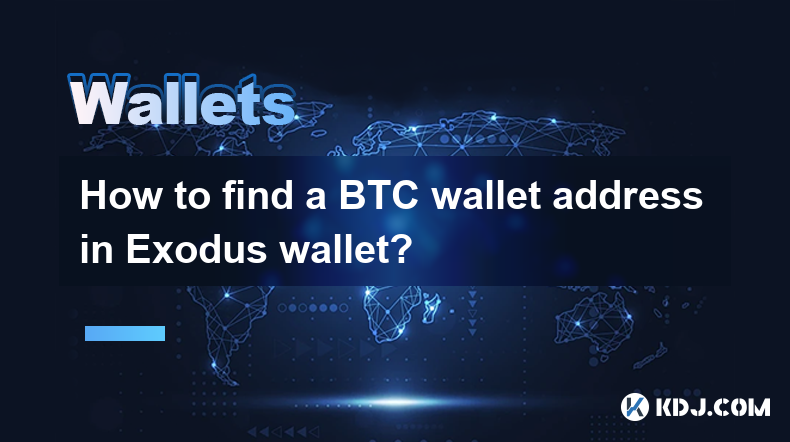
Locating Your Bitcoin Wallet Address in Exodus
Finding your Bitcoin wallet address in Exodus is straightforward. Exodus is a popular multi-currency wallet, meaning it supports numerous cryptocurrencies, including Bitcoin (BTC). Your BTC address is crucial for receiving Bitcoin transactions. Knowing how to locate it is essential for anyone using Exodus to manage their BTC holdings. This guide will walk you through the process step-by-step.
First, ensure you have the Exodus wallet installed and running on your device. If you haven't already, download and install the wallet from the official Exodus website. It's crucial to download from the official source to avoid malicious software. Once installed, open the Exodus application.
Next, you'll need to access your Bitcoin wallet within the Exodus interface. After opening Exodus, you should see a display of all the cryptocurrencies you're currently holding. Locate the Bitcoin (BTC) icon. This usually involves scrolling through the list of assets, or searching for BTC using the search function if available.
Once you've found your Bitcoin wallet, you'll see the balance of your BTC holdings. To reveal your BTC address, you'll need to initiate a receiving transaction. This doesn't mean you're actually receiving funds; it simply displays your address for others to send you Bitcoin.
- Click on the Bitcoin (BTC) icon to open your Bitcoin wallet details.
- You should see a button labeled "Receive," "Request," or something similar. Click this button.
- A new window or screen will appear displaying your unique Bitcoin address. This is the address you should provide to anyone sending you Bitcoin.
- This address is usually represented by a long string of alphanumeric characters. Carefully copy this address and store it securely. Never share this address with anyone you don't trust.
It is vital to understand that each Bitcoin transaction requires a new address. While not mandatory for receiving funds, using a new address for each transaction enhances your privacy and security. Exodus may automatically generate a new address each time you request one, or it might offer the option to generate a new address manually. Check your wallet's options to understand how it handles address generation.
Remember to always verify the address before sending or receiving any Bitcoin. A single misplaced character can lead to irreversible loss of funds. Double-checking the address is a crucial security measure. If you are unsure about the process, seek assistance from the Exodus support team or consult trusted cryptocurrency resources.
The Exodus wallet interface might vary slightly depending on the version you are using. However, the core process of finding your Bitcoin address remains consistent. Refer to Exodus's official help documentation or FAQs if you encounter any difficulties. They provide detailed instructions and troubleshooting steps.
Maintaining the security of your Bitcoin wallet and your private keys is paramount. Never share your private keys with anyone. Keep your wallet software updated to the latest version to benefit from security patches and bug fixes. Regularly back up your wallet to prevent data loss. Consider using a hardware wallet for enhanced security if you are managing significant amounts of Bitcoin.
Using strong and unique passwords is essential for protecting your Exodus wallet. Avoid using easily guessable passwords or reusing passwords across multiple accounts. Enable two-factor authentication (2FA) wherever possible to add an extra layer of security to your account. Be aware of phishing scams that attempt to steal your login credentials or private keys.
Always be cautious when interacting with websites or individuals claiming to offer assistance with your Exodus wallet. Only use official support channels provided by Exodus to avoid falling victim to scams. Regularly review your transaction history to ensure everything is in order and to detect any unauthorized activity.
Understanding Bitcoin Addresses in Exodus
A Bitcoin address is a unique identifier similar to an email address or bank account number. It's a string of alphanumeric characters that allows others to send Bitcoin to your wallet. It is crucial to understand that while you can receive Bitcoin to the same address multiple times, using a new address for each transaction enhances your privacy.
Your Bitcoin address is derived from your public key, which is a cryptographic component of your Bitcoin wallet. Your private key, on the other hand, is a secret key that allows you to spend the Bitcoin associated with your address. Never share your private key with anyone. Losing your private key means losing access to your Bitcoin.
Exodus simplifies the process of managing Bitcoin addresses by automatically generating new addresses when needed. However, understanding the underlying principles of Bitcoin addresses is essential for secure and responsible cryptocurrency management. Familiarize yourself with the concepts of public and private keys to fully grasp the security implications.
Frequently Asked Questions
Q: What if I lose my Bitcoin address?
A: You don't lose your Bitcoin if you lose your address. Your Bitcoin is associated with your private key, not the address itself. However, you won't be able to receive Bitcoin to that specific address anymore. You can always generate a new address within your Exodus wallet.
Q: Can I use the same Bitcoin address multiple times?
A: Yes, you can reuse a Bitcoin address. However, using a new address for each transaction enhances your privacy. Exodus often generates a new address each time you request one.
Q: Is my Bitcoin address safe in Exodus?
A: Exodus employs security measures to protect your assets. However, no system is completely invulnerable. Always practice good security habits, such as using a strong password and enabling 2FA.
Q: What if I accidentally share my Bitcoin address?
A: While not catastrophic, sharing your address with untrusted individuals increases the risk of fraudulent activity. Monitor your transactions closely and report any suspicious activity immediately to the appropriate authorities.
Q: Can I recover my Bitcoin if I forget my Exodus password?
A: Exodus offers recovery options, usually involving a seed phrase or recovery key. Make sure you securely store this information separately from your wallet. Refer to Exodus's support documentation for detailed recovery instructions.
Q: How often should I generate a new Bitcoin address?
A: While not strictly necessary, generating a new address for each transaction offers enhanced privacy. Exodus usually handles this automatically. Consider generating a new address if you have concerns about privacy or security.
Disclaimer:info@kdj.com
The information provided is not trading advice. kdj.com does not assume any responsibility for any investments made based on the information provided in this article. Cryptocurrencies are highly volatile and it is highly recommended that you invest with caution after thorough research!
If you believe that the content used on this website infringes your copyright, please contact us immediately (info@kdj.com) and we will delete it promptly.
- Across Crypto Project Faces Heat: Secret $23M Transfer Sparks Governance Debate
- 2025-06-28 16:30:13
- Trump Coin's Wild Ride: Liquidity Drain, Exchange Deposits, and What It Means for Binance & OKX
- 2025-06-28 16:50:13
- Solana, XRP, and Spot ETFs: A New York Minute on Crypto's Shifting Sands
- 2025-06-28 17:10:13
- Trump, Memecoin Mania, and Whale Watching: A New York Minute in Crypto
- 2025-06-28 16:30:13
- Gemini, Tokenized Stocks, and Europe: A New Era for Investment?
- 2025-06-28 17:10:13
- Shiba Inu, Lending Coins, and Early Holders: A New Frontier
- 2025-06-28 16:51:59
Related knowledge

How to stake cryptocurrencies on Coinbase? Benefits and risks
Jun 27,2025 at 06:36pm
Understanding Cryptocurrency Staking on CoinbaseStaking cryptocurrencies involves locking up digital assets to support the operations of a blockchain network, typically in return for rewards. Coinbase, one of the most popular cryptocurrency exchanges globally, offers staking services for several proof-of-stake (PoS) coins. Users can stake their holdings...

How to contact Coinbase customer service? Support channels and response times
Jun 28,2025 at 01:29pm
Contacting Coinbase Customer Service: Support Channels and Response TimesIf you're a user of Coinbase, reaching their customer service team may become necessary for various reasons, such as account verification issues, transaction disputes, or technical difficulties. Understanding the different support channels available and what to expect in terms of r...
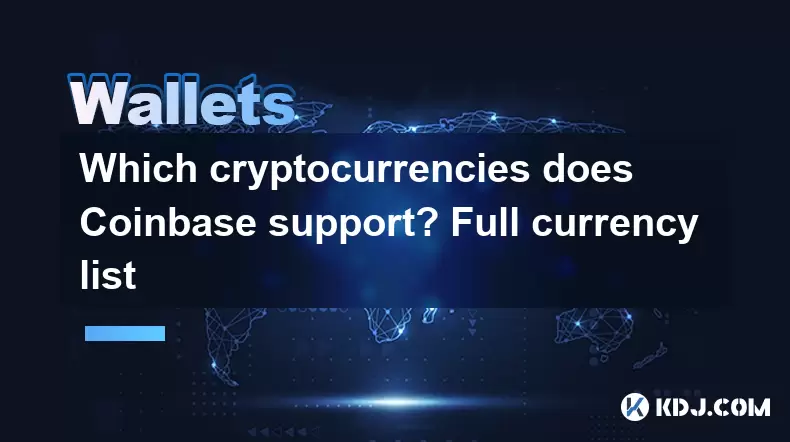
Which cryptocurrencies does Coinbase support? Full currency list
Jun 28,2025 at 08:36am
Overview of Cryptocurrencies Supported by CoinbaseCoinbase is one of the most popular and trusted cryptocurrency exchanges globally. It provides users with a platform to buy, sell, trade, and store various digital assets. As of the latest updates, Coinbase supports over 200 cryptocurrencies, including major ones like Bitcoin (BTC), Ethereum (ETH), and L...
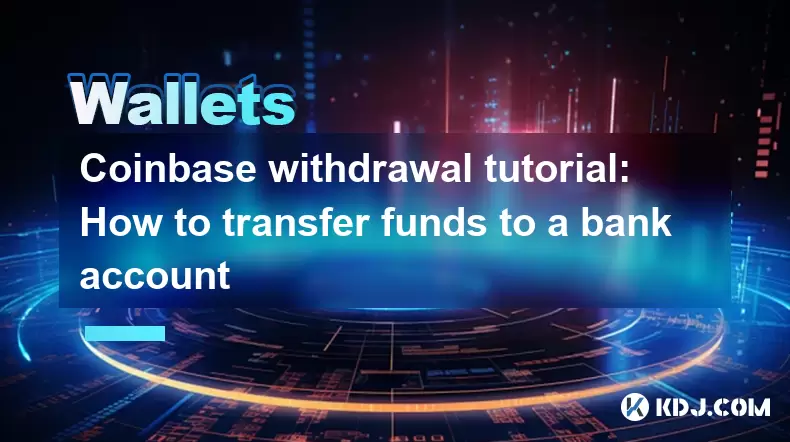
Coinbase withdrawal tutorial: How to transfer funds to a bank account
Jun 28,2025 at 02:35am
Understanding Coinbase WithdrawalsCoinbase is one of the most widely used cryptocurrency platforms, allowing users to buy, sell, and store digital assets. Once you've successfully traded or held your crypto on Coinbase, the next logical step may be to withdraw funds to a bank account. This process involves converting your cryptocurrency into fiat curren...
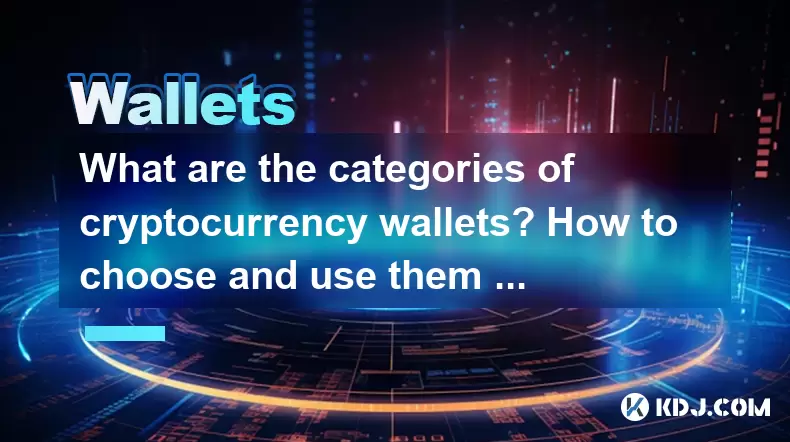
What are the categories of cryptocurrency wallets? How to choose and use them safely?
Jun 21,2025 at 10:42pm
Understanding Cryptocurrency WalletsCryptocurrency wallets are essential tools for anyone involved in the digital asset ecosystem. They allow users to store, send, and receive cryptocurrencies securely. Unlike traditional wallets that hold physical money, crypto wallets manage cryptographic keys—private and public—which interact with blockchain networks...
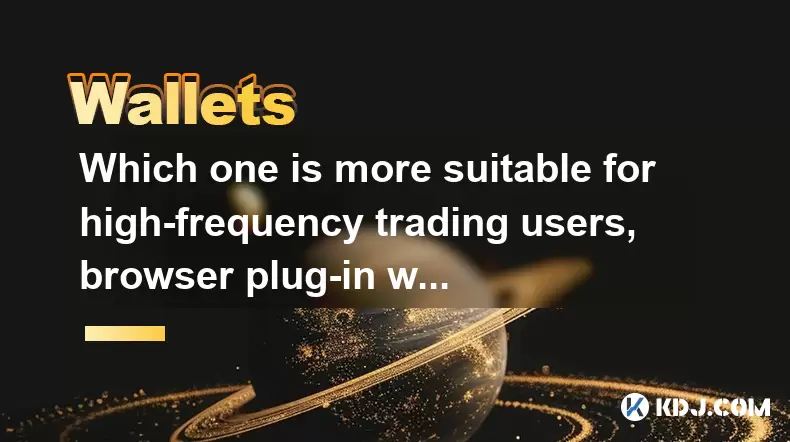
Which one is more suitable for high-frequency trading users, browser plug-in wallets or independent application wallets?
Jun 23,2025 at 08:22am
Understanding the Role of Wallets in High-Frequency TradingFor high-frequency trading (HFT) users in the cryptocurrency market, wallet selection is critical due to the need for speed, security, and seamless integration with trading platforms. HFT involves executing a large number of trades within seconds or even milliseconds, which demands a wallet that...

How to stake cryptocurrencies on Coinbase? Benefits and risks
Jun 27,2025 at 06:36pm
Understanding Cryptocurrency Staking on CoinbaseStaking cryptocurrencies involves locking up digital assets to support the operations of a blockchain network, typically in return for rewards. Coinbase, one of the most popular cryptocurrency exchanges globally, offers staking services for several proof-of-stake (PoS) coins. Users can stake their holdings...

How to contact Coinbase customer service? Support channels and response times
Jun 28,2025 at 01:29pm
Contacting Coinbase Customer Service: Support Channels and Response TimesIf you're a user of Coinbase, reaching their customer service team may become necessary for various reasons, such as account verification issues, transaction disputes, or technical difficulties. Understanding the different support channels available and what to expect in terms of r...

Which cryptocurrencies does Coinbase support? Full currency list
Jun 28,2025 at 08:36am
Overview of Cryptocurrencies Supported by CoinbaseCoinbase is one of the most popular and trusted cryptocurrency exchanges globally. It provides users with a platform to buy, sell, trade, and store various digital assets. As of the latest updates, Coinbase supports over 200 cryptocurrencies, including major ones like Bitcoin (BTC), Ethereum (ETH), and L...

Coinbase withdrawal tutorial: How to transfer funds to a bank account
Jun 28,2025 at 02:35am
Understanding Coinbase WithdrawalsCoinbase is one of the most widely used cryptocurrency platforms, allowing users to buy, sell, and store digital assets. Once you've successfully traded or held your crypto on Coinbase, the next logical step may be to withdraw funds to a bank account. This process involves converting your cryptocurrency into fiat curren...

What are the categories of cryptocurrency wallets? How to choose and use them safely?
Jun 21,2025 at 10:42pm
Understanding Cryptocurrency WalletsCryptocurrency wallets are essential tools for anyone involved in the digital asset ecosystem. They allow users to store, send, and receive cryptocurrencies securely. Unlike traditional wallets that hold physical money, crypto wallets manage cryptographic keys—private and public—which interact with blockchain networks...

Which one is more suitable for high-frequency trading users, browser plug-in wallets or independent application wallets?
Jun 23,2025 at 08:22am
Understanding the Role of Wallets in High-Frequency TradingFor high-frequency trading (HFT) users in the cryptocurrency market, wallet selection is critical due to the need for speed, security, and seamless integration with trading platforms. HFT involves executing a large number of trades within seconds or even milliseconds, which demands a wallet that...
See all articles























